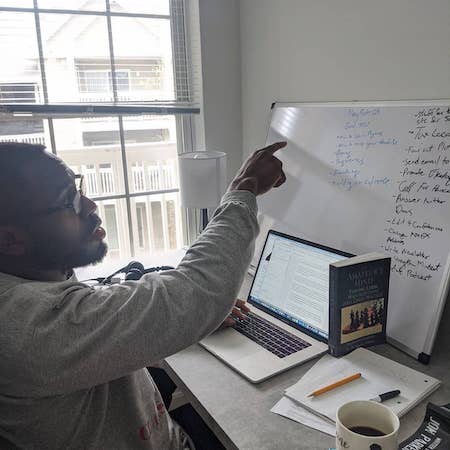Watch here
Two years ago, I had a conversation with an older, wiser mentor of mine. The subject of raising kids and starting a family came up, and she said something that had a tremendous impact on my thinking.
“You and Anna are as ready as you’ll ever be to have kids. The only way to get any more ready is to have them.”
Three months later, we discovered that Anna was pregnant with our son; the rest is a story that will continue to unfold for the rest of our lives. Whenever we encounter a new challenge of parenthood, I hear Dr. Robert’s words in the back of my head.
The only way you get any more ready is to have them.
She was communicating a great truth about taking action to achieve what you want:
Preparation is essential, but after a certain point, the only thing left to do is act. Any more preparation is, at best, a waste of time and, at worst, a comfortable lie we’re indulging in to protect ourselves from the possibility of failure.
Most people understand that at some point, the rubber has to meet the road; otherwise, the car won’t reach its intended destination. The only question remaining is exactly how much preparation and planning is too much.
When have you reached the point where more planning is ineffective and becomes counterproductive and expensive in terms of opportunity cost?
To answer this question, we look to the training that the Marine Corps gives to its officers to help them make decisions in life-or-death situations.
The “70 Percent” Rule
Marine Officers are taught the “70% rule.”
The idea behind the rule is beautifully simple: If you have 70% of what you need to succeed, execute the plan. For example:
- Do you have 70% of the intel you need to make a sound decision?
- Do you have 70% of the resources to survive a protracted conflict?
- Are you 70% sure that your plan will succeed?
The 70% rule isn’t the product of theoretical research. It’s not even an exact amount you can measure. It’s the product of combat experience crafted as a mental model to get you to take action in the face of uncertainty. Humans already hate dealing with uncertainty. We also are strongly driven by the desire to avoid pain.
When you put this apprehension of uncertainty in conditions where injury and death are possible, then you face the possibility of inaction when it will cost you the most. Most of us do not face a challenge that will kill us if we fail, but therein lies the beauty of this thinking style.
Our only opponent is time.
Time
The saying is, “Money loves speed.” This idea is effectively a natural result of the 70% rule. In a zero-sum game, the person who acts first will reap more benefits. Now, don’t take this to mean that everything is a zero-sum game, but if you treat your goals as if they are, you’re FAR more likely to act fast instead of trying to make sure everything is perfect.
I’ve had to learn this lesson on several occasions throughout the ups and downs of online entrepreneurship. Speed beats everything because, unlike on the battlefield, most of the mistakes you make in pursuit of your dreams are not irreversible.
Waiting for the right time to go after what you want will always cause you to miss the “right time.” What I mean by this is that conditions will never be ideal for your plans because plans are ideas, and reality doesn’t care about your ideas. The battlefield of life is constantly changing, and it does this with surprising speed.
The 30% left over after you’ve reached 70% certainty is where adaptation, improvisation, and creativity live. Achieving a level of 70% readiness means that you’re prepared for anything but not everything. Part of what must be factored into that 70% is your ability to respond to the unexpected.
The 70% rule implicitly acknowledges that they change instantly, even when things appear perfect. Ideal conditions could last one moment, and everything gets very bad very quickly. Mountain climbers and sailors are intimately familiar with this idea.
Clear skies can turn violently dangerous in minutes. Even with our level of technology, predicting these weather changes in some areas remains an exercise in futility. Climbers who lack the necessary gear and ability to spot these changes will have a tough time. Also, as another favorite saying of mine goes, “Everyone is a good sailor in calm seas.”
The 70 Percent Rule is a feeling
The 70% rule attempts to measure a subjective feeling objectively. As a result, everyone’s 70% level of readiness will be different.
When I fought professionally, the goal was to “peak” during the week of the fight. “Peaking” means being in the best physical, mental, and emotional shape. While this goal sounds obvious for an athlete, there are a few dangers you have to avoid.
- You can’t train too hard or too intensely; otherwise, your body won’t be able to perform at the highest level on fight night. Granted, the ceiling for a trained athlete is higher, but it still exists. If you go past it, you’re at a severe disadvantage.
- Sparring has to be as close as possible to the intensity of a fight, but if it replicates an actual fight, you’ll be forced to compete as if you just finished fighting.
- Most importantly, you have to be mentally sharp. You can’t be exhausted, bored, or burnt out. While both situations are problematic, a training camp that’s too long is far more detrimental than a training camp that’s too short.
For a fighter to peak when he’s supposed to, training camp can’t take him to 100% of his abilities. There will be nothing left to give the night of the fight. On the flipside, at 50%, there’s still room to improve before the fight. 70% might seem low for an intense event, but you want your:
- Body to be capable of pushing itself without being hurt.
- Mind to be focused on the contest without being distracted by the possibility of taking a result.
- Emotions are to be excited without worrying about whether you can make it through because of how hard you pushed yourself.
I gave this boxing example to set the tone for you to find your personal 70% level. When preparing to accomplish a goal, ask yourself the following questions:
- If I take this action right now, will I worry more or less about the outcome? If you feel you’ll worry less, you’ve spent too much or too little time in the prep phase. You want the event to end so you’re no longer excited about how things will go.
- Should I take on another project? If you’re ready to take on other things, you’re either not invested enough or you’ve done so much preparation that you (delusionally) think the project is a guaranteed done deal. The project should motivate a high level of focus.
- Do I feel prepared? You should feel *slightly* underprepared. A little fear focuses the mind and creates higher performance.
Ask yourself these questions when you’re not sure if you’ve done enough preparation. If you ask these questions at the start of a project, you’ll get misleading answers (false positives).
Hopefully, armed with the 70% solution, you will see that not only is 70% good enough, but it’s often better than being 100% ready.
Let me help you go even further, even faster, with better results
- Are you tired of feeling stuck, unsure of how to make the tough decisions that life throws your way?
- Do you struggle to communicate effectively, even when the stakes are high?
- Have you fallen into a bad habit or way of negative thinking that is costing you time, money, or relationships?
I’ve been a homeless alcoholic whose addiction nearly ruined all of his friendships. I held delusions of grandeur that protected my ego from the harsh reality—I was a loser, and I couldn’t stand the face I saw when I looked in the mirror.
But over the past 15 years, I snatched my life back to become a champion boxer, published author, expert chess player, and devoted husband and father. Along the way, I’ve learned how to change my thinking, inner dialogue, and external communication to make better decisions.
Let’s talk so I can help you do the same faster without hitting rock bottom.
Learn more



